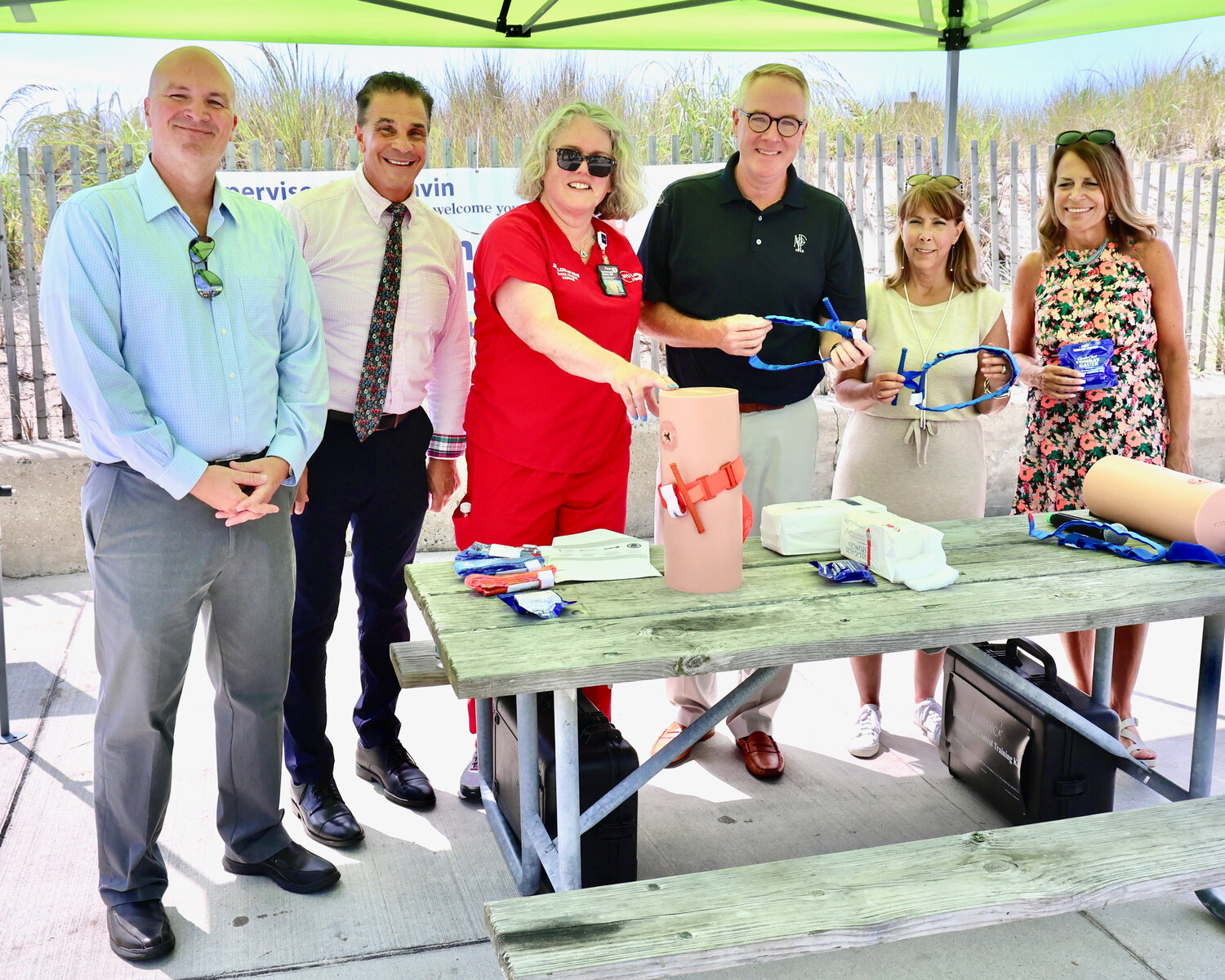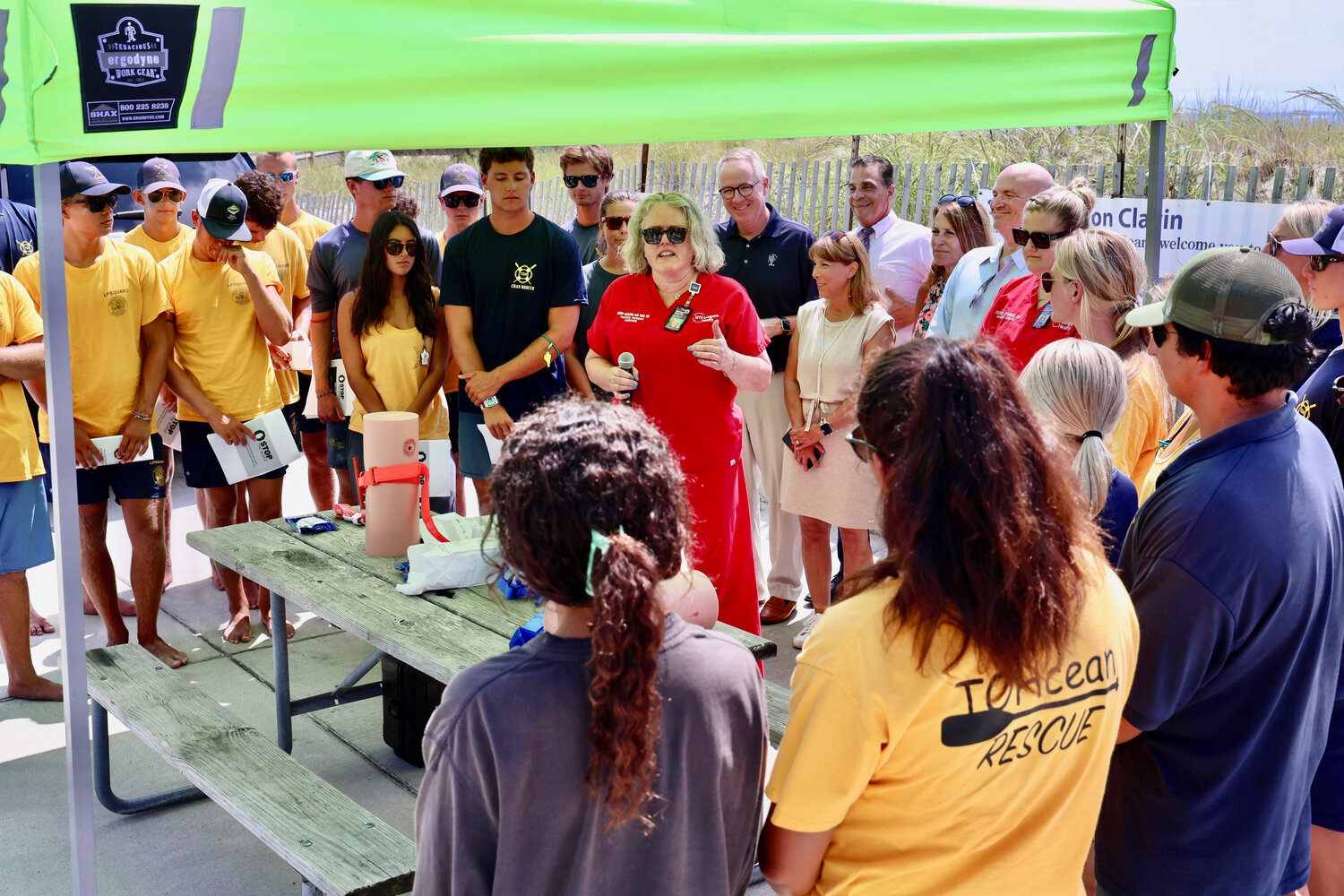See how lifeguards learned to ‘stop the bleed’
Sharks have been the talk of the summer across Long Island. Sightings, and some injuries, have caused a spike in awareness, thanks in no small part to reports on TV news.
On area beaches, concerns have risen about the potential for encounters with sharks. On Aug. 8, off Rockaway Beach, a woman was seriously wounded when a shark bit her left leg.
In a move to address the situation, Hempstead Town Supervisor Don Clavin partnered with NYU Langone Hospital Long Island to facilitate special training for town lifeguards on Aug. 16. More than 20 guards gathered at Town Park in Point Lookout, along with some of the town’s EMTs, to take part in “Stop the Bleed” training.
“Town of Hempstead lifeguards are among the best in the business, and they are always prepared for the worst,” Clavin said. “With shark bites becoming an increasingly prevalent emergency, we need to be proactive in keeping swimmers and beachgoers safe.”
“Stop the Bleed” is a program created by the American College of Surgeons’ Committee on Trauma, designed to equip people with the skills to respond to the emergency of a severe shark bite and control a victim’s bleeding. As stated on the program’s website, someone who is bleeding severely can die in as short a time as five minutes, so rapid intervention by a first responder can save a victim’s life.
Hempstead’s lifeguards protect four miles of coastline, from Point Lookout to Town Park at Lido Beach, Lido Beach West, Malibu Beach, Nickerson Beach and Atlantic Beach. Their training includes certification in cardiopulmonary resuscitation and first aid. For 88 years, Hempstead beaches have not recorded a single drowning while lifeguards have been on duty, according to the town.
Now, guards also have dedicated shark training, focusing on identifying sharks and their swimming patterns. And the town’s approach to this challenge doesn’t end there. Similar to Long Beach lifeguards, it has introduced a specialized Shark Patrol, a unit consists of guards who specialize in handling different watercraft, from jet skis to boats. Drones are now a part of their observational efforts, and when a shark is spotted, protocols are set in motion to protect beachgoers.
Although “Stop the Bleed” training is now focusing on shark bites, the initiative was created in the wake of increasing mass casualty incidents, such as shootings and bombings. It combines lectures and visual presentations with hands-on training. With the help of mock limbs exhibiting a range of injuries, participants practice techniques including wound dressing proper tourniquet application, and precise pressure application.
The intent of the training isn’t to normalize potentially fatal incidents. Rather, it is to empower lifeguard staffs with the knowledge and tools they need to navigate a variety of situations — including traumatic ones — efficiently. Knowing that guards have received specialized training helps build the public’s trust in their abilities, and, it is hoped, beachgoers can feel more secure knowing that guards are prepared to handle a wide array of emergencies.
Clavin expressed his gratitude to NYU Langone for taking the time to teach the town’s lifeguards. “I’m grateful to NYU Langone Hospital Long Island for helping keep Town of Hempstead beachgoers safe by offering this emergency training,” he said. “It’s my hope that town lifeguards will never need to use this training, but the invaluable knowledge of tourniquets and treating excessively bleeding victims will be most helpful in emergency situations.”









